What is insurance CRM software?
Insurance CRM, an abbreviation for “customer relationship management,” is a platform that insurance agencies can use to manage customer data and relationships. This type of CRM system allows companies to organize, store, track and analyze their customers’ interactions. By using this type of technology, insurance agencies can increase productivity and efficiency when managing customer relations. With Right InSur’s insurance CRM platform, companies can access detailed customer information quickly and easily. Additionally, the system helps insurance businesses identify new opportunities for growth by providing better insight into customer behavior.
Right Insure provides a comprehensive suite of features that help insurance agencies keep track of their customer’s data in one central location. The software also offers powerful analytics tools so insurers can gain valuable insights into customer trends and preferences over time.
11 Best insurance CRM software.
Here is a list of the best insurance CRM software.
1. Zoho CRM
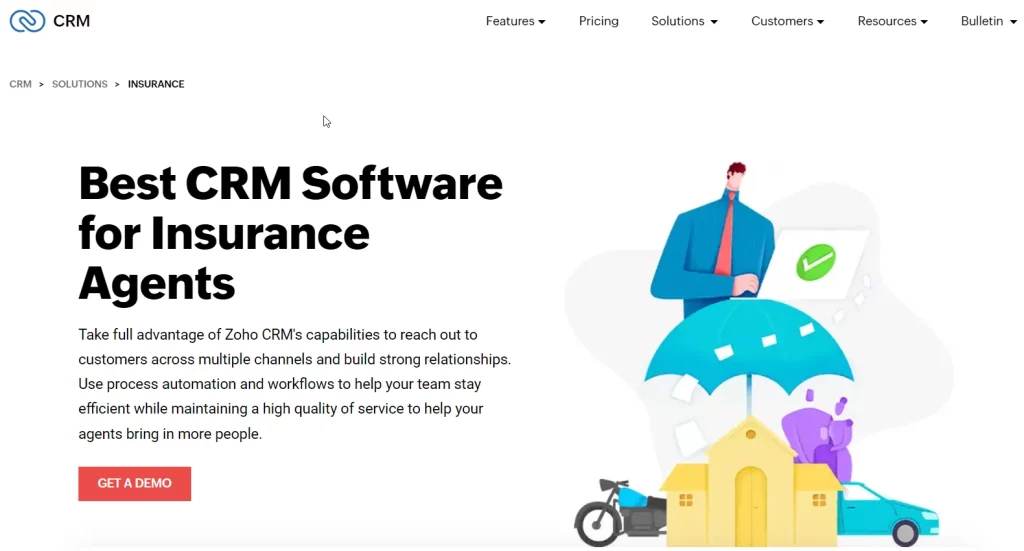
Zoho CRM is a cloud-based CRM solution designed to help small and midsize businesses manage their sales, marketing, and customer service activities. best CRM software for your Insurance companies can benefit from CRM’s customizability, automation capabilities, and wide range of integrations with other software solutions. Zoho industry-specific CRM offers the perfect blend of features and affordability for insurance companies seeking to improve their customer relationships.
The comprehensive suite of tools within Zoho CRM allows insurers to gain insights into customer behavior as well as track leads, opportunities, sales performance figures, analytics data, and more. In addition to tracking customers’ interactions with your business via email campaigns or surveys, you can also set up automated entire insurance workflow workflows that allow you to follow up with customers promptly. This helps increase efficiency by freeing up time for agents who would otherwise be manually managing these tasks.
How much does it cost?
Forever free for up to 3 users.
- BASIC $49 organization /mo.billed annually
- STANDARD $99 organization /mo.billed annually
2. Bitrix24
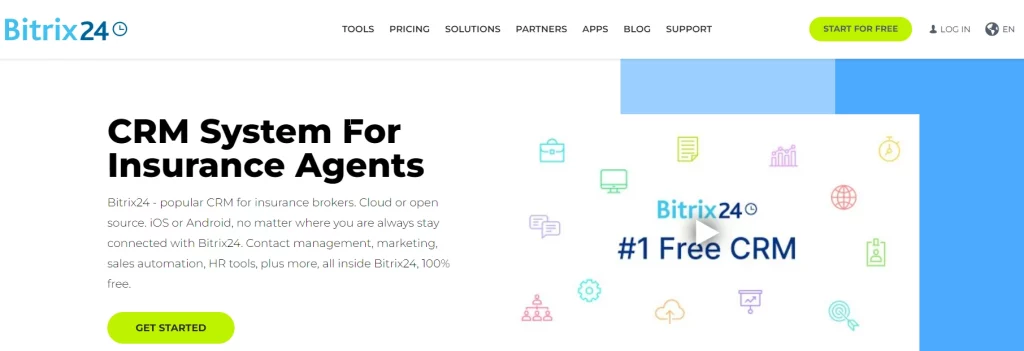
Bitrix 24 CRM is the best CRM for insurance agents who need a comprehensive CRM solution. This CRM software helps insurance agents to manage client relationships and streamline workflows with its range of powerful features. Bitrix 24 offers an intuitive interface, flexible customization options, integration with other systems, and unparalleled customer support.
In terms of tracking leads and clients, Bitrix24’s CRM provides powerful tools to keep track of interactions, create quotes and proposals as well as monitor performance. The system also allows users to segment their contacts into groups for better organization. Plus, it has a built-in email marketing feature that enables agents to send out promotional materials to specific audiences in just a few clicks.
The system’s analytics capabilities help agents stay on top of their business by providing insights into customer trends, sales data, and more.
How much does it cost?
- Starting price is $61 a month.
- A 30-day free trial is available, and a free trial plan for beginner’s business tools is provided.
- $61 per month for cloud storage from the Cloud Basic service.
- Standard: $124 per month.
- A professional provides $249 per month
On-Premise
- One-time license: $2990 for business.
- $24990 (one-time license) is the price of the enterprise license.
3. LeadSquared

Leadsquared software is a cloud-based CRM that helps insurance agents to better engage and manage their customers. It allows agents to capture, track, and nurture leads throughout the sales process to maximize revenue opportunities. This comprehensive tool helps agents streamline operations by automating manual processes such as email marketing, lead tracking, and contact management.
also provides powerful analytics tools in CRM software allowing users to gain insight into their customer base. These insights give insurance companies the ability to better target prospects with relevant campaigns and offers based on real-time data. With features such as automated scoring, insurance workflow automation, and integrated scheduling functions, LeadSquared makes it easy for agents to close more deals while reducing costs associated with traditional CRMs.
How much does it cost?
The first plan begins at $25 per month.
Sales and mobile CRM plans
- LITE at $25 per month (billed per year).
- From $50 per user per month, a PRO subscription is available.
- SUPER costs $100 per month per user (billed annually).
Software plans: Marketing automation.
- At $150 per year (billed annually), Essential is a top-notch bundle.
- BASIC service for a price of $400 a month (invoiced annually).
- $1,200 is the standard monthly rate.
- ENTERPRISE at $2500 / mo
- Free trial: Unavailable
- Free version: Unavailable
4. EngageBay

EngageBay CRM is a powerful customer relationship management (CRM) software that provides businesses with a comprehensive suite of tools to help them manage their customer relationships. The software allows businesses to easily store and organize customer data, track customer interactions, and create targeted campaigns to improve engagement. With EngageBay CRM, businesses can access detailed analytics on customers’ behavior and preferences, allowing them to customize their approach when engaging customers to maximize conversions. Additionally, the software also provides insurance policies that enable customers to receive discounts on certain products or services.
The features of EngageBay CRM make it an ideal choice for companies looking for an effective way of managing their customer relationships. Its easy-to-use interface allows users to quickly set up profiles for each client and track interactions across multiple channels including email, messaging apps, social media platforms, and more.
How much does it cost?
- Starting: $14.99 per month (paid monthly),
- $12.74 per month (paid yearly), or $10.79 per month (paid biennially).
- Growth: $42.49 per month (paid monthly),
- Free trial: Available
- Free version: Available
5. Keap

Keap CRM is a customer relationship management software designed specifically for the insurance industry. CRM helps businesses in the insurance sector streamline their customer service, sales, and marketing processes. Keap CRM offers advanced features such as automation, contact tracking, and automated lead generation, allowing users to quickly find customers and increase sales opportunities. With Keap’s intuitive CRM interface, it is easy to quickly create campaigns and track leads from start to finish.
Keap CRM also provides powerful analytics tools that allow businesses to gain valuable insights into their customers’ behavior and preferences so they can better tailor their services. This includes segmenting customers based on age, gender, or location so businesses can target specific audiences with tailored offers. Additionally, its flexible reporting capabilities enable users to monitor the performances of campaigns over time which helps them make informed decisions about future strategies.
How much does it cost?
- Pro: $129 tier, Max: $200 tier.
Free trial: available
Free version: Unavailable
6. Radiusbob CRM

Radiusbob CRM is a cloud-based customer relationship management software that allows businesses from various industries to manage their relationships with customers and partners. It provides users with powerful tools to help streamline their operations and increase sales, improve customer service, and reach out to more potential clients.
For insurance companies, in particular, Radiusbob is the best insurance CRMs that helps them understand the changing needs of their customers by providing insights into how they interact with the product or service. The software also helps companies improve communication between departments within the organization, allowing for a more efficient workflow when it comes to handling customer inquiries and requests. Furthermore, Radiusbob CRM offers features such as automated follow-up emails and segmentation capabilities that allow insurers to better target potential leads based on individual profiles.
How much does it cost?
Radiusbob has eight pricing options, with prices ranging from $34 to $732.
Cloud-based
- Agent: A user charges $34 per month
- CSR:$68.50 per month for 2 users.
- Agent+VolP:$79 per month for 1 user.
- Broker:$149 per month for five users.
- CSR+VolP:$156 per month for two years
- Agency:$292 monthly, 10 users.
- Broker+VolP:$369 per month for 5 users on the cloud.
- Agency+VolP:$732 per user monthly 10 users.
7. Hubspot CRM

HubSpot CRM is a powerful customer relationship management (CRM) platform designed to help businesses of all sizes streamline their sales processes. This CRM software provides an array of features that allow businesses to automate routine tasks, track customer interactions, and gain valuable insights into customer behavior. For insurance sales teams, HubSpot CRM offers an attractive solution for achieving their goals.
HubSpot CRM allows users to quickly access and update customer records from anywhere. It also features automated lead capture tools and provides real-time notifications when customers interact with emails or landing pages. With dynamic contact segmentation capabilities, it can create lists of target audiences for specific marketing campaigns in just a few clicks. Additionally, its reporting dashboard enables users to monitor progress towards goals like building relationships with potential customers or closing deals faster.
How much does it cost?
- Professional Starts at $450/mo/billed at $5,400/yr
- Enterprise Starts at $1,200/mo/billed at $14,400/yr
8. Oracle cloud
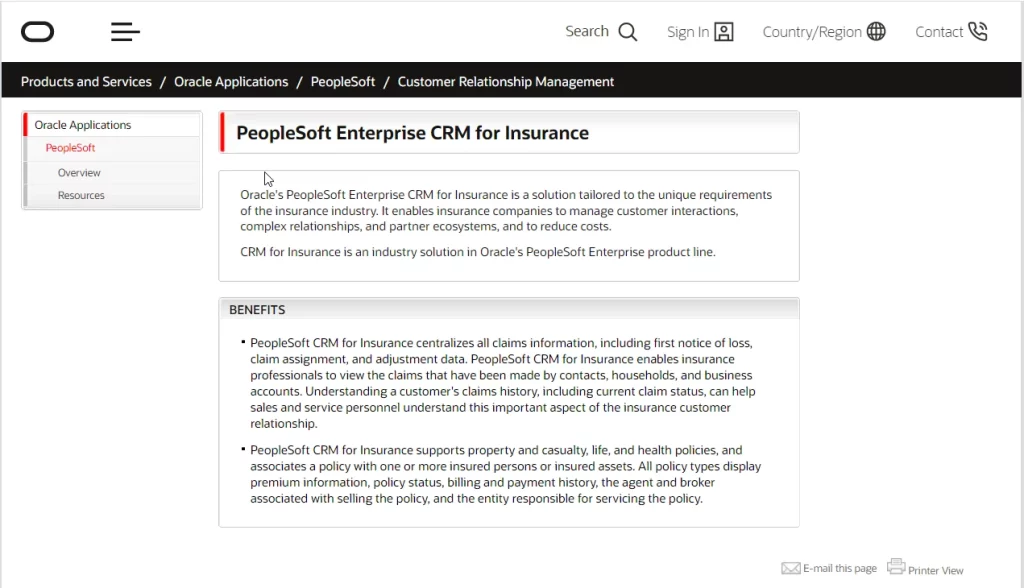
Oracle Cloud CX is an innovative customer experience (CX) platform that helps businesses in the insurance industry streamline their entire insurance process. Oracle Cloud CX allows insurers to provide fast and convenient services to their customers with a holistic, end-to-end approach. With this technology, agents can simplify and automate processes such as policy management and claims processing, allowing them to focus on what matters most engaging with customers.
Moreover, Oracle Cloud CX enables insurers to stay connected with customers by providing features such as integrated chatbots and personalized web portals. This allows insurers to instantly respond to customer inquiries or requests for information and provide automated responses through intelligent conversations. Additionally, customers can make calls directly from the cloud, meaning they don’t need any additional hardware or software installed on their devices – further simplifying the process for both insurers and their customers.
How much does it cost?
Compute
- General purpose VM STARTING FROM $0.0980/hour
Storage
- Block storage STARTING FROM $4.25/month
Networking
- Private connectivity STARTING FROM $1.275/hour
Outbound data
- STARTING FROM $0.0085 per GB/hour
Free trial: available
Free version: Unavailable
9. Zendesk Suite
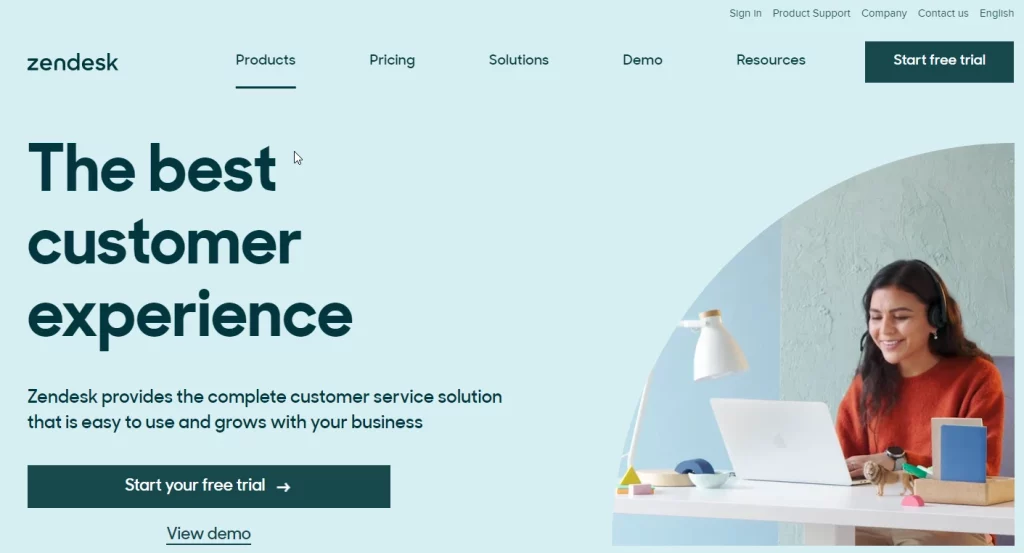
Zendesk Suite is a cloud-based customer service and support platform that enables brokers and agents to provide better service to their customers. With Zendesk CRM software, insurance agents have access to the right CRM tools they need to manage customer conversations, track interactions with customers, create personalized experiences for each customer, and capture feedback.
The suite provides brokers and agents with one unified platform that helps them save time on administrative tasks while providing them with all the features they need to deliver an outstanding customer experience. It also offers analytics capabilities that allow users to measure performance across different channels as well as gain insights into each customer’s behavior. This enables brokers and agents to make informed decisions about how best to serve their clients’ needs.
How much does it cost?
Price begins at $49.00 per month.
- Suite Enterprise US$ 150 per agent/month billed annually
- Suite Team US$ 49 per agent/month billed annually
- Suite Professional US$ 99 per agent/month billed annually
- Free trial: available
- Free version: Unavailable
10. Maximizer CRM
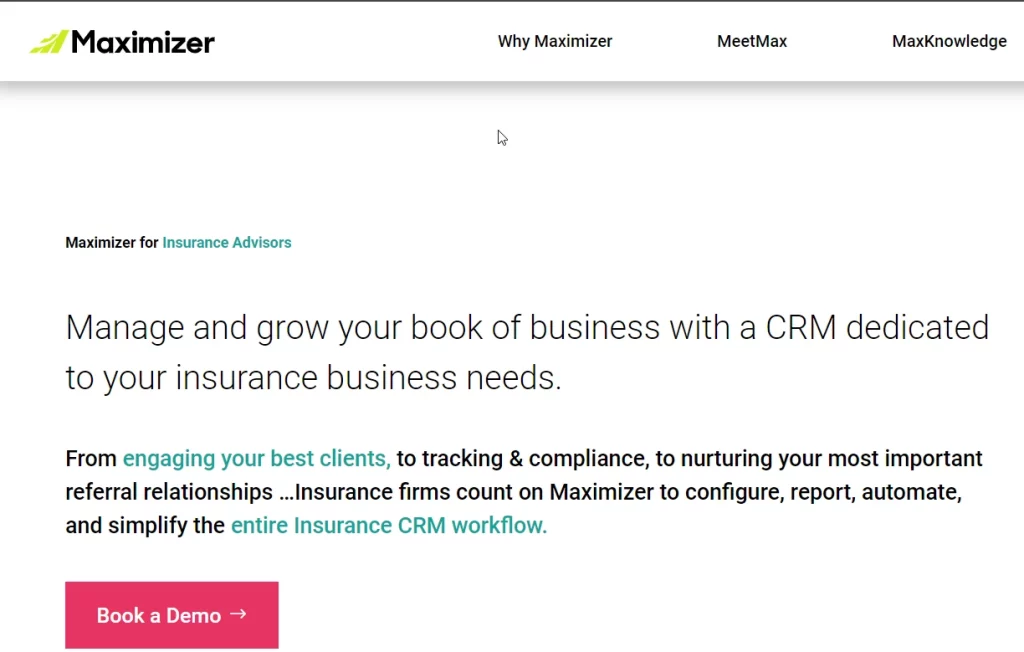
Maximizer CRM is a customer relationship management (CRM) platform that provides insurance providers with the tools and resources to manage sales, marketing, customer service, and operations. With Maximizer CRM, agents can easily access up-to-date data on customers and prospects. It also helps increase efficiency in managing high volumes of leads as well as tracking customer inquiries.
The software provides a unified database for insurance agents to store client information and track communications. This makes it easy for agents to stay organized by quickly viewing a client’s profile history which includes emails sent, conversations held, activities completed, tasks assigned, and more. With its intuitive dashboard feature, users have a quick insight into the status of ongoing projects so they can make informed decisions before contacting their clients or prospects.
How much does it cost?
The price package starts at $55 per month
- Small Office for a year costs $29 USD month-to-month, or $39 USD per month.
- Business Plus $59 USD billed monthly $49 USD billed annually
- Insights $89 USD mo. billed every year $109 USD mo. billed every month.
- Premise (Self-hosted) + On-Premise Business Edition: $49 USD per month billed annually (No User Limits) + Insights: $89 USD per month billed annually (50 User Minimum)
- Free trial: available
- Free version: Unavailable
11. Salesmate CRM

Salesmate CRM is an intuitive and versatile software designed to help businesses of all sizes manage their customer relations. It offers a wide variety of features, including insurance offers, contact management, lead generation, analytics, and reporting capabilities. With Salesmate’s innovative platform, organizations can easily keep track of their sales pipeline and monitor the progress of potential customers.
Salesmate has been designed specifically to meet the needs of sales teams across multiple industries. It allows users to create custom profiles for each customer with detailed information about their unique needs and preferences. This includes creating personalized quotes for different products or services as well as automated follow-up emails that are triggered based on certain criteria. Additionally, with CRM integrated seamlessly analytics system users can get insights into how successful their strategies are performing in regard to customer acquisition and retention rates over time.
How much does it cost?
Prices begin at $12.00 per month.
Salesmate provides 3 pricing packages: starter, growth, and enable. Sign up for a free trial of Salesmate for 15 days.
- $12 per month is billed annually to the starter plan.
- A Plan of Growth: $24 per user month, reserved annually.
- One-time payment of $40 per year for the Plan Boost service.
- Free trial: available
- Free version: Unavailable
There are various insurance CRM features to consider.
A good and well-rounded insurance CRM ought to have a large group of apropos functions and attention to detail so that your insurance agent can efficiently market your insurance agency. A great place to start is with these must-have features.
1. Seamless Prospect Keeping
In today’s rapidly growing digital world, understanding where to find and evaluate potential customers is key to success for any company. Your first step should be evaluating the best insurance options, such as getting the right coverage from reliable providers that can fit your budget. Additionally, it is important to consider Customer Relationship Management (CRM) software as an integral part of your strategy. Insurance CRM helps companies track leads from various sources so you can better understand which lead sources are delivering the most value and conversions.
This analysis will help you develop a successful lead-sourcing strategy tailored to your specific business needs. Once you have identified good lead sources, create campaigns that target them based on their preferences and interests to ensure maximum engagement with customers. Also, use a combination of content marketing tactics such as SEO activities, email campaigns, and social media outreach in order to increase brand visibility across all channels.
2. Automatic distribution systems
When lead generation is a key part of any business, it is essential to ensure the right team is allocated to move it down the sales funnel. Agents and companies that are involved in insurance need to make sure they have a CRM system in place in order to efficiently manage leads. This helps identify potential customers and allocate them accordingly. When the inflow of leads is low, there are certain steps that can be taken to increase successful conversions.
Firstly, it is important for agents and companies to review their existing practices and look for areas of improvement. It may be necessary for teams to collaborate more closely or take advantage of modern technology such as artificial intelligence (AI) or automation tools. Additionally, marketing teams should focus on generating higher-quality leads by targeting specific customer segments with tailored messaging.
3. Priority
After the lead is transmitted to the sales team or your customer service staff, they should be able to evaluate the significance of each lead. If you are distributing the lead in the proper way is important for seeing how to best use your resources.
Prioritization, such as distribution, can be tailored to the specific needs of the business. You can select to give a higher priority to leads that have come through a particular source, to those with particular financial characteristics, or based on any other logic which will yield the greatest return.
4. Mobile
Insurance agencies or companies that use mobile CRM software must be prepared to provide a more flexible insurance experience to their clients. Despite the popularity of stationary client management software, mobile software provides excellent flexibility and scalability that bigger companies may fail to find in their alternative. Mobility allows insurance agencies to cut down on wasted time by providing real-time updates. It helps boost revenue and profit
How customer relationship management helps insurance companies.
1. Acquisition of a new business
Insurers can greatly transform their operations by creating a system of capturing customer, representative, and prospect data through multiple channels, including web, phone, branch, SMS, email, mobile, and self-service portal. Throughout the duration of the integration process, it requires meticulous attention to working with distinct systems such as new business underwriting, document management system (DMS), mail room, and analytics. It also minimizes the number of registered complaints by establishing a uniform welcome call procedure.
2. A professional service offers assistance
Insurance companies can see all the information related to brokers and independent agents, such as pay percentages and commissions, in one place. They can generate commission and tax code statements on demand and save demographic information through a streamlined process to the agent management system.
3. The customer servicing function.
Insurance CRM provides end-to-end service 360 and is set up to handle many types of requests in a single workflow. This generates an FCR rate of upwards of 90 percent. The use of auto-population and intelligent communication templates reduces the amount of time that executives spend completing data entry.
Conclusion
In conclusion, insurance CRM is an invaluable tool for insurance companies. It provides insight into customer behavior and makes interactions efficient and effective. Implementing a CRM will help to increase customer satisfaction and retention, resulting in increased revenue. In addition, the use of a CRM system allows users to manage data more effectively while providing actionable insights from analytics. Finally, insurance companies should consider investing in insurance CRM software if they are looking to optimize their customer relationship management processes and maximize profits.

